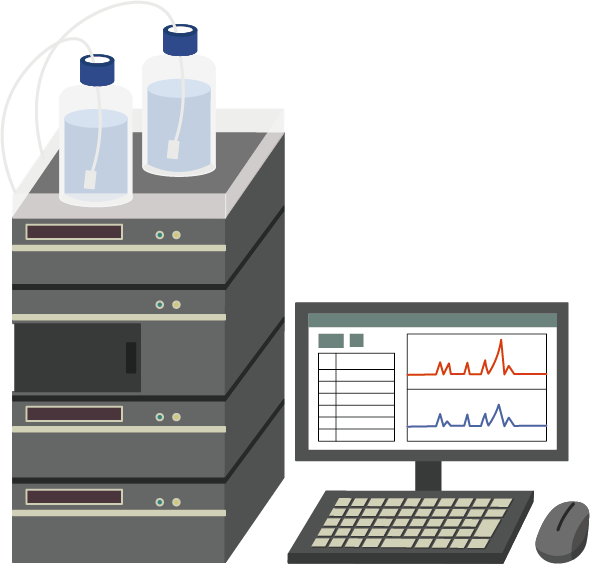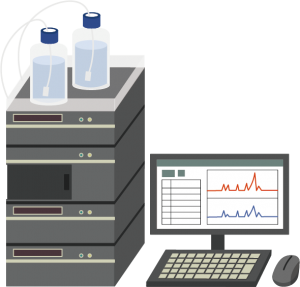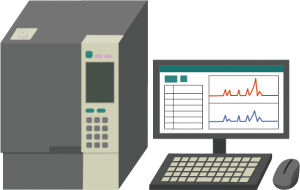Kanna Testing
Kanna Potency Testing
Turnaround time: 48 hours
Altitude Consulting uses liquid chromatography to test the potency of mesembrine, the most sought after compound available in Kanna products. With the use of the latest HPLC-DAD technology and software we ensure the most accurate results in analyzing these samples.
Compound Covered:
- Mesembrine
*Please reach out if you are interested in testing other compounds found in Kanna.
Instrument Used:
High Performance Liquid Chromatography (HPLC)

Kanna Potency Testing
Turnaround time: 48 Hours
Altitude Consulting uses liquid chromatography to test the potency of mesembrine, the most sought after compound available in Kanna products. With the use of the latest HPLC-DAD technology and software we ensure the most accurate results in analyzing these samples.
- Mesembrine
High Performance Liquid Chromatography (HPLC)
Kanna Residual Solvents Testing
Turnaround time: 48 hours
Altitude Consulting uses GC/MS Headspace to test for 19 common solvents used for extraction and cleaning of Kanna products. GC/MS technology gives us the ability to identify unknown hits. Testing for solvents can be useful for ensuring that solvents used for extractions have been fully removed before proceeding in the formulation process.
Compounds Covered:
- 2-methylbutane
- Acetone
- Acetonitrile
- Benzene
- Butane
- Ethanol
- Ethylbenzene
- Isobutane
- Isopropanol
- M+P xylene
- Methanol
- N-Heptane
- N-hexane
- N-pentane
- O-xylene
- Propane
- Tetrahydrofuran
- Toluene
Instrument Used:
Gas Chromatography—Mass Spectrometry (GC-MS) Headspace

Kanna Residual Solvents Testing
Turnaround time: 48 Hours
Altitude Consulting uses GC/MS Headspace to test for 19 common solvents used for extraction and cleaning in the Kanna industry. GC/MS technology gives us the ability to identify unknown hits. Testing for solvents can be useful for ensuring that solvents used for extractions have been fully removed before proceeding in the formulation process.
- 2-methylbutane
- Acetone
- Acetonitrile
- Benzene
- Butane
- Ethanol
- Ethylbenzene
- Isobutane
- Isopropanol
- M+P xylene
- Methanol
- N-Heptane
- N-hexane
- N-pentane
- O-xylene
- Propane
- Tetrahydrofuran
- Toluene
Gas Chromatography—Mass Spectrometry (GC-MS) Headspace
Heavy Metals Testing
Turnaround time: 1-2 Weeks
Heavy metals tend to be toxic to humans at even very low concentrations. For now, there isn’t state mandated testing required on Kanna products. Nevertheless, ensuring the absence of heavy metals is a safe choice on behalf of those who use your products.
Compounds Covered:
- Arsenic (Ar)
- Cadmium (Cd)
- Lead (Pb)
- Mercury (Hg)
Instrument Used:
Inductively Coupled Plasma Mass Spectrometry (ICP-MS)

Heavy Metals Testing
Turnaround time: 1-2 Weeks
Heavy metals tend to be toxic to humans at even very low concentrations. For now, there isn’t state mandated testing required on Kanna products. Nevertheless, ensuring the absence of heavy metals is a safe choice on behalf of those who use your products.
- Arsenic (Ar)
- Cadmium (Cd)
- Lead (Pb)
- Mercury (Hg)
Inductively Coupled Plasma Mass Spectrometry (ICP-MS)
Pesticides Testing
Turnaround time: 1-2 Weeks
Pesticides are often used to help keep crops growing strong and rid them of pesky pests. Unfortunately, just as much as they help keep plants alive, they harm humans. Although there isn’t mandated testing for Mesembryanthemum tortusom, pesticides are often used to aid in the growth of the Kanna plant. We’ve worked with AB Sciex to develop a method to detect over 50 different pesticides to ensure that your products are safe.
Instrument Used:
Gas Chromatography—Mass Spectrometry Triple Quadrupole (GC-MS-MS)

Compounds Covered:
- Abamectin
- Acephate
- Acequinocyl
- Acetamiprid
- Azoxystrobin
- Bifenazate
- Bifenthrin
- Boscalid
- Carbofuran
- Chlorantraniliprole
- Chlorpyrifos
- Chlorfenapyr
- Clofentezine
- Cyfluthrin
- Cypermethrin (technical)
- Daminozide
- Diazinon
- Dichlorvos
- Dimethoate
- Ethoprophos
- Etofenprox
- Etoxazole
- Fenoxycarb
- Fenpyroximate
- Fipronil
- Flonicamid
- Fludioxonil
- Hexythiazox
- Imazalil
- Imidacloprid
- Kresoxim-methyl
- Malathion
- Metalaxyl
- Methiocarb
- Methomyl
- MGK 264
- Myclobutanil
- Naled
- Oxamyl
- Paclobutrazol
- Parathion-methyl
- Permethrin
- Phosmet
- Piperonyl butoxide
- Prallethrin
- Propiconazole
- Propoxur
- Pyrethrins
- Pyridaben
- Spinosad
- Spiromesifen
- Spirotetramat
- Spiroxamine
- Tebuconazole
- Thiacloprid
- Thiamethoxam
- Trifloxystrobin
Minimum sample sizes:
Biomass: 1g
All other samples: 0.5g
Pesticides Testing
Turnaround time: 1-2 Weeks
Pesticides are often used to help keep crops growing strong and rid them of pesky pests. Unfortunately, just as much as they help keep plants alive, they harm humans. Although there isn’t mandated testing for Mesembryanthemum tortusom, pesticides are often used to aid in the growth of the Kanna plant. We’ve worked with AB Sciex to develop a method to detect over 50 different pesticides to ensure that your products are safe.
- Abamectin
- Acephate
- Acequinocyl
- Acetamiprid
- Azoxystrobin
- Bifenazate
- Bifenthrin
- Boscalid
- Carbofuran
- Chlorantraniliprole
- Chlorpyrifos
- Chlorfenapyr
- Clofentezine
- Cyfluthrin
- Cypermethrin (technical)
- Daminozide
- Diazinon
- Dichlorvos
- Dimethoate
- Ethoprophos
- Etofenprox
- Etoxazole
- Fenoxycarb
- Fenpyroximate
- Fipronil
- Flonicamid
- Fludioxonil
- Hexythiazox
- Imazalil
- Imidacloprid
- Kresoxim-methyl
- Malathion
- Metalaxyl
- Methiocarb
- Methomyl
- MGK 264
- Myclobutanil
- Naled
- Oxamyl
- Paclobutrazol
- Parathion-methyl
- Permethrin
- Phosmet
- Piperonyl butoxide
- Prallethrin
- Propiconazole
- Propoxur
- Pyrethrins
- Pyridaben
- Spinosad
- Spiromesifen
- Spirotetramat
- Spiroxamine
- Tebuconazole
- Thiacloprid
- Thiamethoxam
- Trifloxystrobin
Gas Chromatography—Mass Spectrometry Triple Quadrupole (GC-MS-MS)
Minimum sample sizes:
Biomass: 1g
All other samples: 0.5g
Microbials Testing
Turnaround time: 1-2 Weeks
As with growing any plant, fungus and mold can quickly become a problem. That’s why verifying that there is no yeast or mold before processing helps to guarantee that it will not begin to flourish during processing to ensure that products are safe for consumption.
Compounds Covered:
- Yeast
- Mold
Instrument Used:
Thermal Cycler—Fluorometer used for Quantitative Polymerase Chain Reaction (qPCR)
Microbials Testing
Turnaround time: 1-2 Weeks
As with growing any plant, fungus and mold can quickly become a problem. That’s why verifying that there is no yeast or mold before processing helps to guarantee that it will not begin to flourish during processing to ensure that products are safe for consumption.
- Yeast
- Mold
Thermal Cycler—Fluorometer used for Quantitative Polymerase Chain Reaction (qPCR)
Common questions

Yes! Altitude Consulting is the only ISO 17025 accredited Kanna potency analytical lab in the US.
When it comes to Kanna, a plant containing selective serotonin reuptake inhibitors (SSRIs), knowing your dose is important. This becomes even more important if you are selling Kanna products to customers. Analytical testing can provide accurate information about your product to both you and your customers.
We use a variety of instrumentation for Kanna testing, depending on the test. These include High-Performance Liquid Chromatography (HPLC), Gas Chromatography-Mass Spectrometry (GC-MS) Headspace, GC-MS Triple Quadrupole, Inductively Coupled Plasma Mass Spectrometry (ICP-MC).
All testing has a small margin of error to account for different factors such as standards, instrumentation, human error, etc. The margin of error that we work within is ±5% of reported value, for mesembrine. Certificates of Analysis for every standard used are available upon request, just give us a shout.
They can, but because results are based on weight of sample, the extra water weight in the sample will make the results be artificially lower than those of a dry sample. Alternatively, we are happy to dry your sample in our lab! We use methods that are nondestructive to the compounds of interest.

